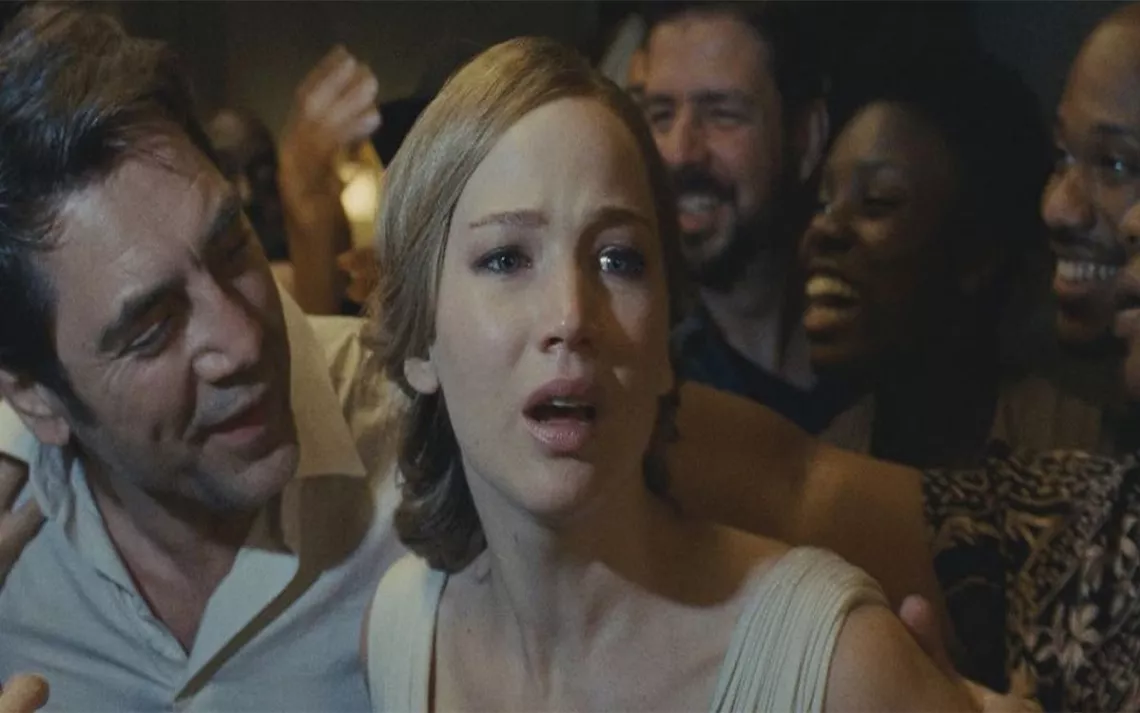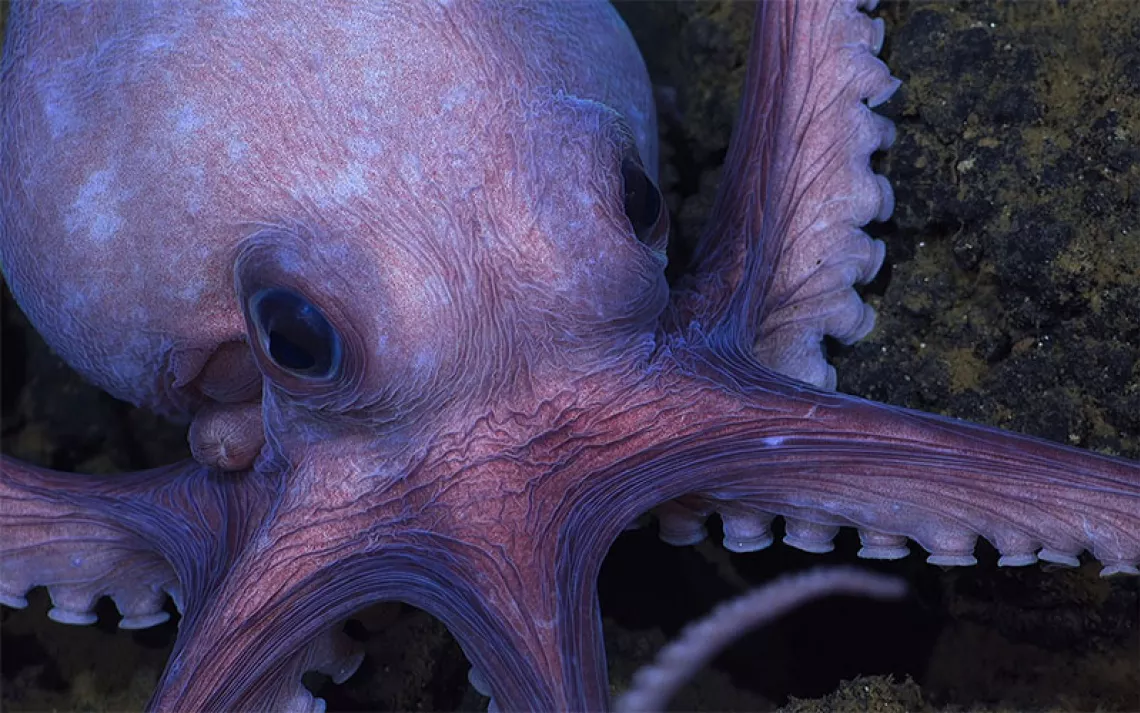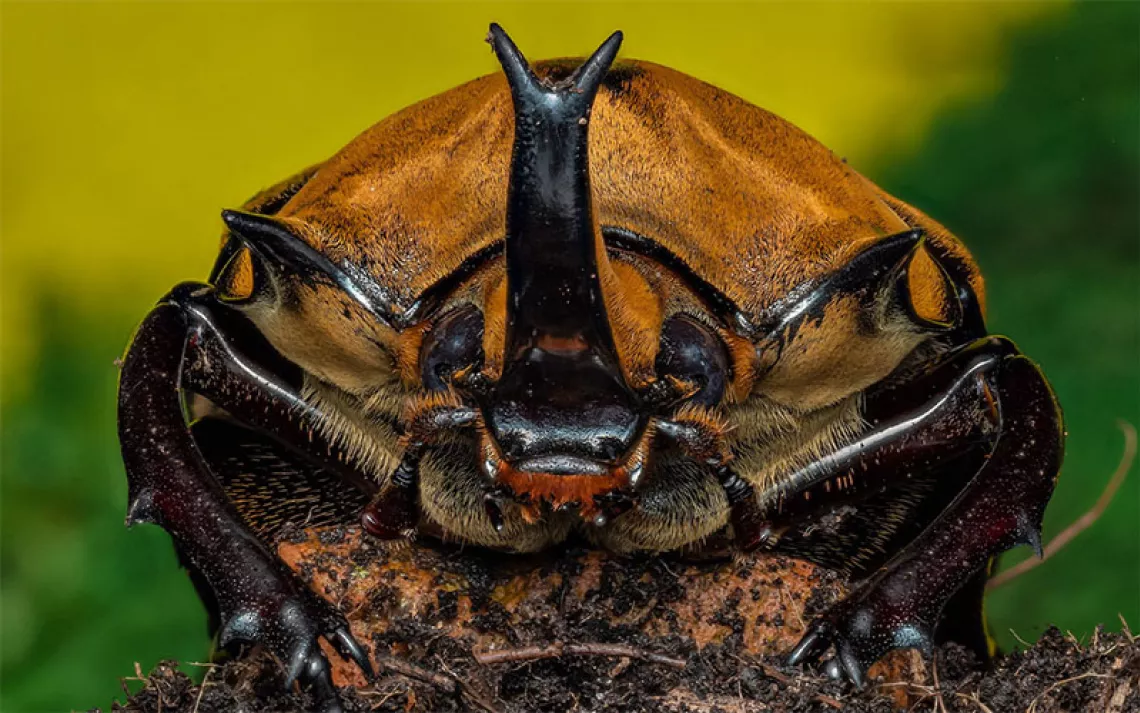O Mother, Where Art Thou?
Darren Aronofsky’s “Mother!” offers a bleak fable about the fate of Earth

Photo courtesy of Paramount Pictures
In the Hollywood pantheon of creepy movie mothers (a list that would include Mrs. Iselin in the Manchurian Candidate, Norma Bates in Pyscho, and Mary in Precious) surely the cruel stage mom from Black Swan has a place. In that 2010 psychodrama, Barbara Hershey played Erica, who at once infantilizes and idolizes her ballet dancer daughter. When not psychologically torturing her daughter, Erica spends her days in her bedroom painting one self-portrait after another in a vortex of narcissism. Though a minor part, the mother figure in Black Swan was a key element of that film’s larger exploration of the artist’s often-tortured psyche and the price of pursuing perfection.
Big themes, to be sure—but that’s how Darren Aronofsky, the director of Black Swan, likes to roll. From his early Requiem for a Dream to the biblical blockbuster Noah, Aronofsky has distinguished himself as among Hollywood’s more cerebral filmmakers, ever eager to use his art to study the human condition. In the new horror film Mother!, Aronofsky’s mother figure couldn’t be more different from what he offered in Black Swan: In place of a paranoid narcissist, we get a woman who is so passive, so self-denying, that she allows the destruction of everything she loves. In the course of depicting that destruction, Aronofsky delivers to audiences some of the most disturbing—frankly, some of the most sick and twisted—images that have ever appeared in a major studio production. With its awful imaginings and ambitious allegory, Mother! is likely to be one of the most talked about, and most intensely polarizing, films of the year. (Full disclosure: Aronofsky is a board member of the Sierra Club Foundation.)
Let’s begin at the beginning. In a house located in the middle of a pastoral paradise, a once-famous poet (Javier Bardem) is struggling with an epic case of creative impotence as his wife (Jennifer Lawrence) spends her days fixing up the place and making an idyll straight out of a Kinfolk spread. Then one night comes a foreboding knock on the front door. The visitor (Ed Harris) is a fan of the poet, a surgeon, he claims, who just wants to meet his idol before he succumbs to a terminal illness. The visitor is a bit of a knucklehead, just about the worst houseguest ever, but he’s not half as obnoxious as his wife (Michelle Pfeiffer), who shows up the next day and quickly proceeds to trash the kitchen while making morning cocktails.
The poet is thrilled by the arrival of the fan, whose adoration tickles his vanity. The woman of the house, however, is righteously annoyed by the intrusion. Yet despite her frustration, she can’t bring herself to kick them out. The poet and his wife’s attempts at domestic bliss strain under the invasion—then they snap when the visitors’ quarrelling sons show up and a fistfight over the family estate spirals into bloody fratricide.
This might sound violent, but, in an age of Game of Thrones torture scenes, it’s not all that horrific, right? More than any plot action, it’s the mood of Mother! that creeps us out. From the opening scene, Aronofsky conjures an atmosphere of doom. There’s no music in Mother!, not a note; Aronofsky uses the moans and groans of the old house to fill in the sonic space, creating an effect of hovering malice. The color palette is muted—all grays and blacks and browns. At the same time, the camera keeps a hair’s-breadth closeness to its subjects, contributing to a sweaty claustrophobia. Not once in the movie do we leave the confines of the house.
The magical realism of the whole thing (an octagonal house in the middle of nowhere without even a footpath leading to the door?) is a clear tip-off that what we’re dealing with here is a carefully constructed allegory. Instead of characters, Aronofsky presents us with archetypes. In place of cinematic setting, there’s just the theater-like stage of the house. No one is ever addressed by name, and the credits list the players in the broadest of terms: Bardem is simply “Him,” Harris is “Man” and Pfeiffer “Woman,” and Lawrence, of course, the eponymous “Mother.”
“I am I,” Bardem’s poet says at one point, “I have to create. That’s what I do. That’s who I am.” Those lines, among other clues, provide a Rosetta stone for Mother!’s symbolism. It’s not giving anything away to point out that the movie is a biblically inspired fable about humanity’s mistreatment of nature. The poet, of course, is the all-powerful yet frustrated father-god (wouldn’t you have an awful case of writer’s block after creating the world?). Mother is Mother Nature, the feminine divine. Harris and Pfeiffer are Adam and Eve, the bunglers who manage to disrupt paradise, and their warring offspring are supposed to represent Cain and Abel. The house—a beating-heart entity psychically conjoined with the mother—is evidently our earthly home, a place that gets trashed again and again by the poet’s gluttonous fans.
Normally one would offer a spoiler alert before a giveaway like that, but Aronosfky has made sure that his intentions are clear—that the audience will get it. “I was just trying to be truthful to what’s going on, and the reality is that we defile the earth, we steal from the earth, we rape the earth, we take from the earth, and you know we don’t clean up after ourselves,” the writer-director recently told a film festival audience. “And for the first time in human history, we are seeing the limit of her bounty, and the seas are emptying and filling with our waste.”
If that’s the starting place, no wonder everything is so dark. Each archetype has a touch of evil, and the actors seem to relish the malevolence of their roles. One would expect Eve to be mischievous, but in Pfeiffer’s snarky portrayal, she’s also mean. Naturally, Adam is not self-aware; then Harris takes it further and makes his idiocy malevolent. At first appearance, I figured he was supposed to be some kind of Beelzebub, what with his consumptive cough and veined skin. These two are rotten to the core.
Javier Bardem is as perfect as you’d imagine as the struggling artist, that big block head of his communicating both vulnerability and a barely contained rage. Aronofsky’s God is the Old Testament God—vain and petty, a creative genius with a low emotional IQ. As his ego swells, he grows corrupted. In one late scene, Bardem’s interminable, implacable patriarchal glare is among the most frightening performances of his career (and given his role in No Country for Old Men, that’s saying something).
Aronofsky takes the morality play to what would seem an inevitable conclusion—a fearful fantasia of chaos and violence. I do not want to write about what happens toward the end. Aronofsky puts on the screen sights that (especially as a new-ish father) I can’t put into words.
Mother! is dark and twisted, to be sure, and that’s obviously Aronofsky’s point. Things are bad and have been for a long time. I have to wonder, though: Will audiences get it? Or will they find the film too tiresome to decode, too troubling to sit through? (There’s little doubt some moviegoers will walk out of the theater.)
I can’t argue with Aronofsky’s depiction of the situation as it is. To say that Mother Nature is being raped is not a use of metaphorical language. It’s exactly what’s happening. But I have a hard time agreeing with what seems to be his takeaway—that we are destined to destroy our home planet. The final frames make his point clear: No matter what we do, the wheel of fate will continue its awful turn.
I wish the filmmaker’s bravery in his artistic ambitions had been matched by a courage to imagine that there might be opportunities for redemption.
 The Magazine of The Sierra Club
The Magazine of The Sierra Club



